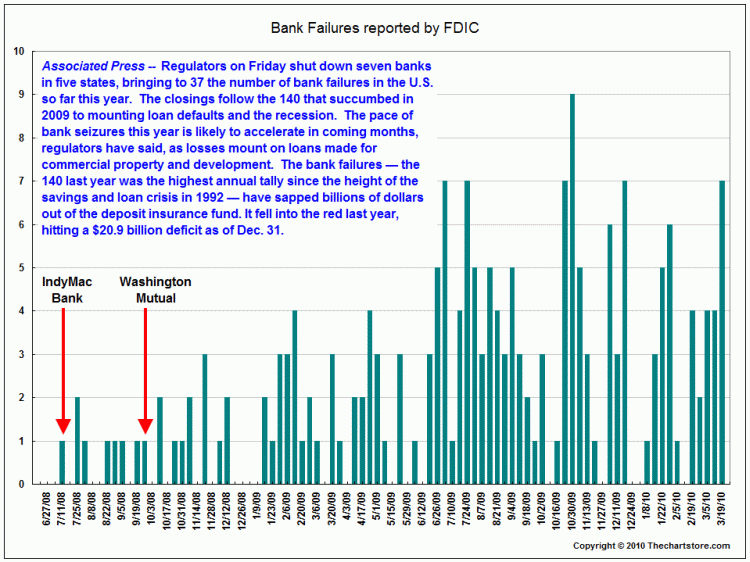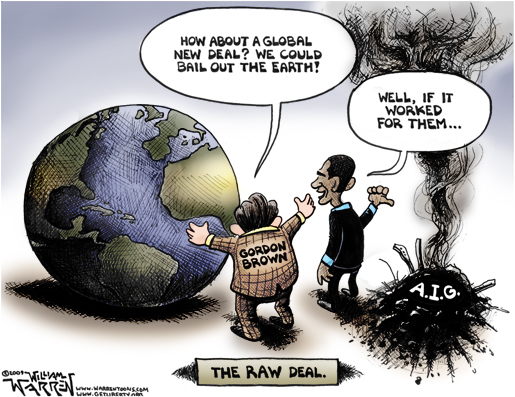Paul Krugman summed it up nicely:
There is, as always, a tunnel at the end of the tunnel: We’ll spend years if not decades fixing this thing.
Love it or hate it, the US has just taken a big step towards nationalized health care so maybe now we can finally stop talking about it and move on with the investing! I think medical devices (IHI) should do well with 32M new patients – that's a play we made quite a while ago though and, like pretty much everything else in this market – they look a little toppy.
As I noted in the Weekend Wrap-Up, we came to the decision to get back to cash on Friday, removing all uncovered bullish bets and adding our disaster plays, no longer hedges (as there's not much to hedge) but as bets that the Global markets are due for a little correction at this point. I'm already feeling good about the decision as the futures look awful this morning (8am) as the Hang Seng dropped 2% (437 points) and couldn't get back over 21,000 during the session and has now given up all of March's gains. The Dow is still up about 400 points in March as well – hopefully our fall won't be as violent as what the Hang Seng saw this morning. India held up well, only losing 1% after Friday's surprise rate increase.
The Dollar was very strong after the Health Care vote and we're sitting below $1.50 to the Pound and we've bounced off $1.35 to the Euro twice this morning – a break below there could get very interesting! The Yen is staying down at 90.5 to the Dollar, which is a relief for Japanese exporters but I'm not sure they'll hold 90 this week. Copper broke below $3.40 on Friday – confirming our bearish turn and is at $3.32 this morning. Gold once again is testing $1,100 and silver failed $17 at $16.82 with $16.50 being a bearish signal for metals. Oil dropped all the way to $79.31 this morning and we'll see if they can get back over $80 but we are going to be thrilled with our short plays (see wrap-up) in that sector.
“Risk aversion has come up after developments in India and Greece,” said Henrik Gullberg, a fixed-income strategist at Deutsche Bank AG in London. “Any exiting of the current accommodative policy stance is bad for risk appetite and good for the dollar.” Greek bonds tumbled for a third day, with the yield on the two-year note jumping as much as 18 basis points to 5.55 percent. National Bank of Greece SA, the nation’s biggest lender, led stock declines in Athens, sinking as much as 5.3 percent. The cost of insuring against a default on Greek government bonds rose, with credit-default swaps climbing 26 basis points to 356 – something we'll have to keep a close eye on this week.
Chancellor Merkel told investors they shouldn’t expect this week’s European Union summit to agree on assistance for Greece, resisting calls for the specifics of a rescue plan, which helped send Greek bonds to their lowest in more than three weeks. Europe is down 1% across the board ahead of the US open as the dollar pushes that $1.35 mark. There is a lot of concern over in Europe that the ECB and BOE will follow India's Central Bank in raising rates but that concern will not be mirrored by US investors, most of whom are not aware that India has a Central Bank and many of whom, sadly, can't identify India on a map.

Something we should all have plenty of practice identifying this year is failing banks. On Friday, the FDIC shut down 7 banks, bringing our 2010 total to 37, on pace to shatter last year's record of 140! As I pointed out in yesterday's "Hedging for Disaster – 5 Plays that Make 500% if the Market Falls," the FDIC seems to step in when banks are already critically short of assets. The pattern we noted on Friday was that the FDIC had to make up 40% of the implied assets to shut down the banks. In the case of Utah's $1.6Bn Advanta bank, the FDIC could not find anyone willing to take over the operations and the fund took a hit of $636M on that bank alone.
 The US may not have officially lost it's AAA rating yet but bond investors have voted with their feet as it costs the US government 3.5 basis points more to borrow money for two years than it does for Buffett's BRK/A as well as PG, JNJ and LOW – who have all recently gotten better terms than Uncle Sam on their loans. The $2.59 trillion of Treasury Department sales since the start of 2009 have created a glut as the budget deficit swelled to a post-World War II-record 10 percent of the economy and raised concerns whether the U.S. deserves its AAA credit rating.
The US may not have officially lost it's AAA rating yet but bond investors have voted with their feet as it costs the US government 3.5 basis points more to borrow money for two years than it does for Buffett's BRK/A as well as PG, JNJ and LOW – who have all recently gotten better terms than Uncle Sam on their loans. The $2.59 trillion of Treasury Department sales since the start of 2009 have created a glut as the budget deficit swelled to a post-World War II-record 10 percent of the economy and raised concerns whether the U.S. deserves its AAA credit rating.
The increased borrowing may also undermine the first-quarter rally in Treasuries as the economy improves. “It’s a slap upside the head of the government,” said Mitchell Stapley, the chief fixed-income officer in Grand Rapids, Michigan, at Fifth Third Asset Management, which oversees $22 billion. “It could be the moment where hopefully you realize that risk is beginning to creep into your credit profile and the costs associated with that can be pretty scary.”
While Treasuries backed by the full faith and credit of the government typically yield less than corporate debt, the relationship has flipped as Moody’s Investors Service predicts the U.S. will spend more on debt service as a percentage of revenue this year than any other top-rated country except the U.K. America will use about 7 percent of taxes for debt payments in 2010 and almost 11 percent in 2013, moving “substantially” closer to losing its AAA rating, Moody’s said last week. I may have mentioned liking TBT at some point…
What I'm not liking is cracks showing up in the armor of even those companies that serve our top 10% club. TIF missed estimates despite positive sales growth as gross margins decline due to, you guessed it – rising commodity prices (diamonds and gold) as TIF is yet another corporation that is having trouble passing along costs. Just as scary as TIF if news that the Four Seasons in Maui has gone delinquent on its $425 million of mortgages. MSD Capital LP, the private investment firm of Dell Inc. founder Michael Dell and his family, skipped the February payment on the debt as it seeks to restructure the loan.
The Four Seasons Maui has struggled in the past year along with most luxury hotels in Hawaii. Its occupancy fell to 60% in last year's third quarter from 79% a year earlier, according to Realpoint. Its net cash flow declined from $32.9 million in 2007 to $10.9 million in the first three quarters of 2009. MSD Capital bought the Four Seasons Maui for $280 million in 2004. It then refinanced the property in 2006 with the two mortgages totaling $425 million.
What is the world coming to when the Four Seasons can't make their mortgage payments? Like I said – I'm not regretting our decision to get to cash one bit – sounds like Michael Dell can use some…


